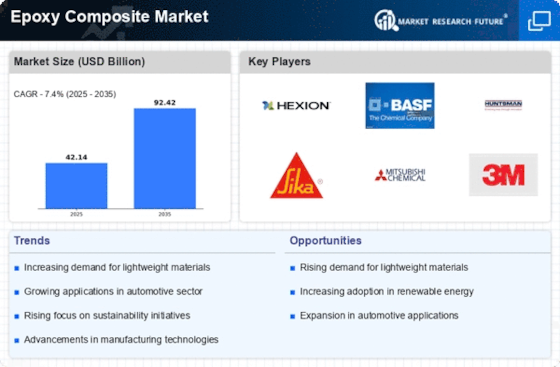Top Industry Leaders in the Epoxy Composite Market
 Epoxy composites, those resin-infused warriors wielding remarkable strength and versatility, are quietly conquering diverse industries. From towering wind turbine blades to sleek aerospace components, they're the backbone of innovation, and their market reflects this crucial role. Let's delve into this dynamic domain, exploring the key players, their winning strategies, and the factors influencing market dominance.
Epoxy composites, those resin-infused warriors wielding remarkable strength and versatility, are quietly conquering diverse industries. From towering wind turbine blades to sleek aerospace components, they're the backbone of innovation, and their market reflects this crucial role. Let's delve into this dynamic domain, exploring the key players, their winning strategies, and the factors influencing market dominance.
Key Players and Winning Strategies:
-
Global Composite Titans: Companies like Hexcel (France), Toray Industries, Inc. (Japan), SGL Carbon SE (Germany), Mitsubishi Chemical Holdings Corporation (Japan), and Cytec Industries Inc. (US) hold significant market share. They wield vast production capacities, diverse product offerings, and established global footprints. Hexcel, for instance, dominates the aerospace segment with its high-performance epoxy prepregs.
-
Regional Champions: Players like China National Building Materials Group Company Limited (China) and Jongshin Corporation (South Korea) excel in specific regions, capitalizing on local manufacturing expertise and understanding regional infrastructure needs. Jongshin caters to the booming South Korean shipbuilding industry with its cost-effective epoxy composites.
-
Sustainability Champions: Emerging players like Evonik Industries AG (Germany) and Green Composites (US) are carving a niche through eco-friendly offerings. Evonik focuses on developing bio-based and readily-recyclable epoxy resins, aligning with the growing demand for sustainable solutions.
-
Niche Specialists: Smaller players like Gurit Holding AG (Switzerland) and Solvay (Belgium) push boundaries with cutting-edge advancements. Gurit specializes in innovative sandwich composites for lightweighting applications, while Solvay focuses on advanced epoxy prepregs for high-temperature environments.
Factors Shaping Market Share:
-
Performance and Durability: Meeting diverse industry needs with strong mechanical properties, resistance to harsh environments, and long lifespans is crucial. Hexcel's high-performance aerospace composites exemplify this focus.
-
Sustainability and Environmental Footprint: Reducing carbon footprint, minimizing harmful chemical usage, and utilizing renewable feedstocks are becoming essential criteria for market penetration, driven by stricter regulations and eco-conscious consumers. Evonik's bio-based epoxy resins resonate with this trend.
-
Cost-Effectiveness and Value Proposition: Balancing high performance with competitive pricing is vital, particularly in price-sensitive segments like civil infrastructure. Jongshin's cost-effective composites find favor in budget-conscious projects.
-
Technological Advancements and Applications: Constant research and development into new epoxy formulations with improved functionalities like fire resistance, self-healing, or electrical conductivity opens up new avenues for market growth. Gurit's lightweighting sandwich composites illustrate this trend.
Key Companies in the Epoxy Composite market include
- Axiom Materials
- Barr day
- Hexcel Corporation
- Mitsubishi Chemical Corporation
- Park Aerospace Corp.
- Sanders Composites
- SGL Carbon
- Replies d.d.
Recent News
In April 2023, Hexcel Corporation announced plans to expand carbon fiber production capacity in France due to increased demand from aerospace and industrial sectors for epoxy composites.
March 2023 saw the launch by SGL Carbon SE of Sigrafil C T50-4.8/280 - an epoxy-based carbon fiber composite material designed specifically for automotive applications that offers high strength combined with low weight and cost efficiency improvement.
July 2022, Spirit AeroSystems Europe has partnered with Hexcel at its Aerospace Innovation Centre (AIC) in a strategic alliance aimed at developing environmentally sustainable technologies that can be employed during upcoming aircraft manufacturing processes.
June 2022: NIAR Automated Technologies Laboratory for Aerospace Systems is researching automated fiber placement (AFP) of AX-7810-610, a solvent-based Ceramic Matrix Composites prepreg from Axiom Materials able to withstand temperatures up to 1,650 °F commonly used in engine components.










